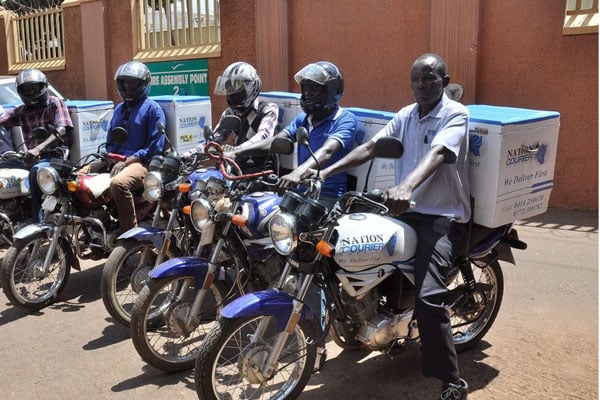
Mr Deus Turyamureeba, the head of circulation and distribution at Nation Media Group. PHOTO/ MICHAEL KAKUMIRIZI
|Prosper
Prime
Real-time parcel tracking drives quick deliveries
What you need to know:
To delve deeper into the intricacies of Nation’s courier business, Prosper magazine’s Richard Luyombya sat down with Mr Deus Turyamureeba, the head of circulation and distribution at NMG which also operates Nation Courier Uganda to uncover strategies of the ever-evolving business landscape.
In an era marked by rapid globalisation and digital transformation, the courier industry is a conduit for seamless communication and commerce. As one of the leading media conglomerates in East Africa, Nation Media Group (NMG)’s courier division stands at the forefront of this dynamic sector. To delve deeper into the intricacies of the company’s courier business, Prosper magazine’s Richard Luyombya sat down with Mr Deus Turyamureeba, the head of circulation and distribution at NMG which also operates Nation Courier Uganda to uncover strategies of the ever-evolving business landscape.
How has the rise of e-commerce impacted the courier industry’s operations, and what strategies have NGM Courier adopted to adddress to this change?
We have invested in tracking systems to enhance real-time tracking and visibility through technology. We have also improved delivery options such as last-mile services and collection points while addressing increased volumes from e-commerce.
What are the key challenges facing the courier industry today?
The rising fuel costs and expensive last-mile deliveries, particularly in upcountry areas, pose significant challenges for the courier industry. Similarly, increased competition from buses, taxis, lorries and boda bodas adds to the competitive landscape.
Additionally, high regulatory costs and the digitisation of the courier business further compound these challenges. As the world rapidly evolves in terms of technology and e-commerce, the courier industry must adapt accordingly. Furthermore, unrealistic customer expectations, particularly regarding last-mile deliveries, contribute to the complexity, especially in regions like Wakiso and Entebbe.
In what ways has technology transformed the courier industry, and what trends are shaping its future?
Technology has enhanced operational efficiency through improved processes. Focus is now on enhancing customer service standards. We are implementing automation, particularly in billing processes where we offer real-time tracking capabilities and provide delivery reports in real-time to both senders and recipients.
How is NMG courier coping with the emerging technologies?
We prioritise customer experience and client relationship management by emphasizing personalised service. We automate the pickup and delivery process to ensure efficiency and reliability. Clients receive real-time updates regarding pickup and delivery statuses for enhanced transparency.
We invest in advanced tracking systems for both vehicles and packages, ensuring accurate monitoring and security. Additionally, we employ strategies to minimise fuel consumption and optimise routes through the use of routing software, which dynamically adjusts based on parcel volumes to maximise efficiency.
How do you ensure the security and integrity of the packages you handle, in the face of increasing theft and fraud?
We offer goods in transit insurance to protect shipments during transportation. We utilise self-sealing and dispatch bags to ensure the safety of parcels. All employees undergo background checks for security purposes. Our storage facilities are equipped to handle various types of parcels. We employ CCTV cameras and tracking systems for enhanced security and monitoring. Additionally, we provide lockable storage options for fragile, critical, and sensitive items.
What are the primary factors influencing pricing models within the courier industry, and how do you balance affordability with profitability?
Pricing considerations include the weight, dimensions, and value of the package or consignment. Additionally, service levels requested by the client, such as message courier or specialised courier, are taken into account. Distance, operating costs, fuel prices, and customer volumes also influence pricing decisions.
What strategies are you employing to optimise delivery networks and ensure efficient and timely service to customers?
Implementing a real-time tracking system is essential. Investing in infrastructure is critical for growth and efficiency.
Prioritising improved customer experiences is key. Providing continuous staff training ensures ongoing development.
Expanding through partnerships and agents enhances reach and service offerings. Bringing on board more business partners strengthens the network and fosters growth.
What does the future of couriers look like?
The success of Nation Courier hinges on its ability to adapt to evolving market demands and embrace technological advancements, cater to customer requirements, and comply with regulatory standards set by Uganda Communications Commission (UCC).
Currently, registered courier companies in Uganda only serve 40 percent of the available market, while the remaining 60 percent relies on unregistered firms such as lorries, buses, and boda bodas for courier services.
Urgent intervention from UCC is necessary to address this disparity, enabling registered courier companies to expand their operations and cope with rising operational costs, taxes, and annual licensing requirements.




